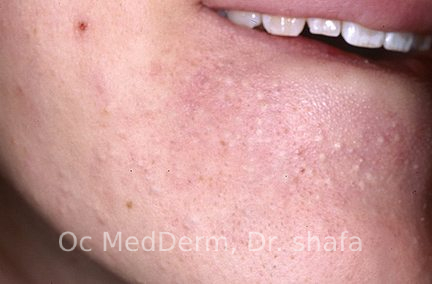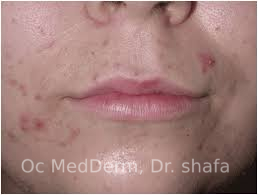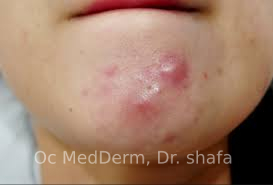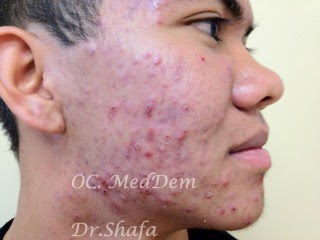What is Acne? Why me?
You are not alone! Acne – the medical term for pimples – is actually the most common skin disorder in North America, affecting 85% of adolescents and often continuing on into adulthood.
Luckily, many effective treatments are available for getting rid of existing acne and preventing new outbreaks from happening. There are also cosmetic treatments that can help diminish the appearance of acne scars and discoloration – a common issue that many patients struggle with.
How Does Acne Develop?

Acne occurs when hair follicles on your skin become blocked and inflamed. Special glands called sebaceous glands are located beneath the surface of the skin. As you can see in the illustration, these glands are normally attached to the base of hair follicles. They can often be found on the skin of the face, neck, chest, upper back, and arms.
Sebaceous glands deposit sebum – a natural oil that helps lubricate your skin and hair – at the base of the hair follicle. Throughout the day, sebum moves up the hair shaft and through the opening of hair follicles, known as your pores.
During adolescence, sebaceous glands enlarge and increase sebum production. This is why it’s common for teenagers to begin to have oily skin, which often continues into adulthood. Sometimes, this increased sebum combines with dead skin and bacteria to form a plug that blocks the hair follicle. Bacteria overgrow and cause inflammation around the follicle, forming a red, tender, and swollen pimple called a comedone.
What are the Different Types of Acne?

There are actually many different types of acne. One person can have different kinds at the same time and throughout the course of their life. Non-inflammatory acne is the mildest form and includes blackheads and whiteheads.
Blackheads, also called open comedones, form when the pore around the follicle remains open. The pimple appears black because it is exposed to the air and elements.
Whiteheads, or closed comedones, form when the blockage occurs beneath the surface of the skin and the pore closes around it, forming a white or yellow bump.
Inflammatory acne refers to pimples that are red and swollen, a sign of underlying infection. For this reason, inflammatory acne tends to be more painful and requires more comprehensive treatment. Inflammatory acne includes pustular, papular, nodular, and cystic forms of acne.
Causes of Acne
Acne is caused by a variety of factors, including hormonal changes and imbalances, stress, your diet and nutrition, the kinds of products you use on your face, and underlying medical conditions. Every person’s skin reacts differently to these factors, so there cannot be a ‘one-size-fits-all’ approach to treating acne. When you meet with Dr. Shafa, she will use her extensive medical knowledge to get to the root of your specific acne, and what treatment approach will work best for you.
How bad is my acne?



When should I see a Doctor for my acne? Prevention is Easier than Correction.
Dr. Shafa highly recommends beginning acne treatment as soon as possible to avoid frustration with acne scars. Mild, moderate, or even severe acne treatments are still more rewarding and less expensive than late acne scar treatment.
We advise you to treat your acne before you start developing scars. However, if you already have acne scars call us to schedule your complimentary consultation to be educated about your acne or learn about treatment options.
Acne Treatment Options
There are a variety of different treatments that can be used in combination to treat your acne, depending on what type you have. For most types of acne, Dr. Shafa can perform a manual extraction of problematic areas in the office – a painless procedure that can clear up an outbreak without leaving any scars.
Never try to ‘pop’ your own pimples – this can lead to infection and scarring, and often makes breakouts worse. Other in-office procedures that Dr. Shafa can perform include facials, skin resurfacing, and acid peels – treatments that result in instantly smooth, vibrant, and healthy skin.
In addition, Dr. Shafa can use a variety of medications to help get your acne under control. These include retinoid creams or gels, benzoyl peroxide, topical or oral antibiotics, or – in certain cases – oral isotretinoin (Accutane). Schedule your free consultation today and Dr. Shafa will work with you to develop a custom, personalized approach to regaining your healthy, beautiful skin!
What are the goals of acne treatment?
- Heal existing lesions.
- Prevent the formation of new lesions.
- Treat and prevent permanent discoloration.
- Prevent scarring and improve old acne scars.
By achieving these goals we can minimize the psychological stress and prevent the emotional and physical scarring caused by acne. Self-confidence and ease in socialization will be regained.
What can we treat with medications?
- Hormonal imbalance
- Skin inflammation
- Skin irritation
- Overproduction of oil in the skin
- Dysfunctional hair follicle lining shedding
- Acne scars
- Skin infection
- Skin discoloration
- Acne pain and discomfort control
Acne and You
The more you are educated about acne, the more successful you will be in treating it. Learning about the basic causes of acne and treatment options allows you to be more involved in making decisions regarding the best action for your acne.
Acne Treatment Results (Before and After)
The following are before and after photos of our actual patients


Ask questions or Call us to make an appointment for your full skin check or an evaluation of a concerning skin lesion. We are contracted with all PPO insurances and Medicare.
Other Treatment
Acne Surgery | Acne Home Therapy | Accutane or Isotretinoin | Topical Treatment for Acne | Acne Scar Overview | Acne Scar Correction with TCA | Acne Scar Leveling with Plasma Laser and Steroid Injection | Fractional CO2 Laser for Acne Scar | Subcision for Acne Scars Removal | Scar Excision – A Good Choice for Deeper Scars | Acne Before and After
Schedule a Consultation
